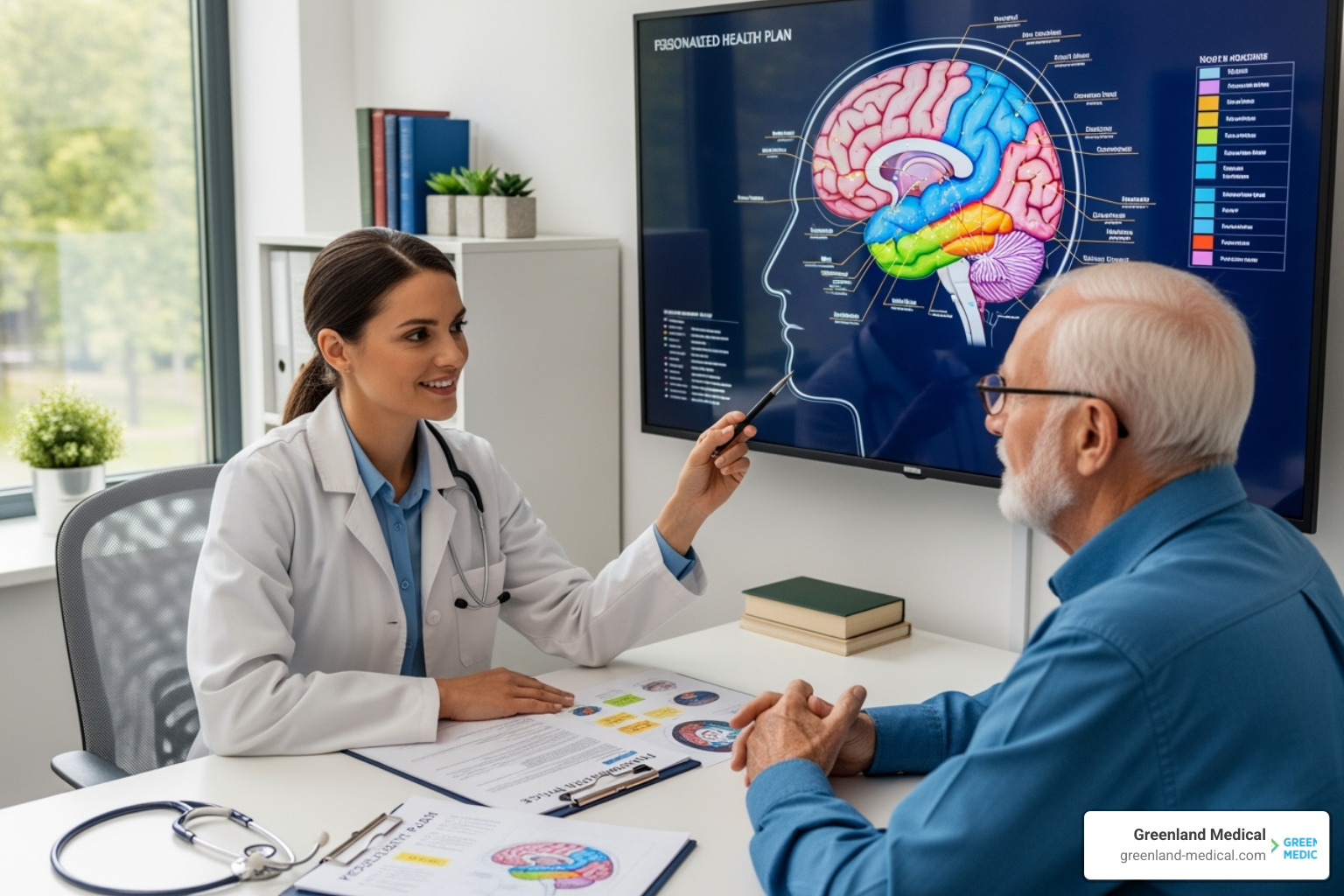
Beyond Symptoms: The Functional Medicine Blueprint for Dementia Care
Why Functional Medicine Offers New Hope for Dementia Care
Functional medicine for dementia represents a shift from treating symptoms to addressing the underlying causes of cognitive decline. Instead of only managing symptoms with medication, this approach seeks to identify and correct the root imbalances that contribute to brain dysfunction.
Key aspects include:
Root-Cause Analysis: Identifying inflammation, nutrient deficiencies, toxins, and metabolic issues.
Personalized Protocols: Creating custom treatment plans based on individual testing.
Multi-Modal Approach: Combining nutrition, supplements, lifestyle changes, and detoxification.
Prevention Focus: Addressing cognitive decline before irreversible damage occurs.
Systems Thinking: Understanding how gut health, hormones, and inflammation affect the brain.
This approach is vital as dementia affects over 55 million people worldwide, and traditional drugs have shown limited success in halting disease progression. The functional medicine model recognizes that cognitive decline stems from interconnected factors like chronic inflammation, insulin resistance, and environmental toxins. By addressing these, many patients see improvements in memory, focus, and overall brain function.
I'm Dr Andrew Greenland, a medical doctor and Certified Functional Medicine Practitioner specializing in cognitive health. My practice, Greenland Medical, uses the Bredesen Protocol to provide functional medicine for dementia care, helping patients address the root causes of cognitive decline through personalized, evidence-based interventions.
A New Perspective: Understanding Dementia Through a Functional Lens
Functional medicine for dementia views cognitive decline not as an inevitable part of aging, but as the brain's protective response to various threats. Think of symptoms like a car's check engine light—they signal an underlying problem that needs to be investigated, not just covered up.
This perspective reveals dementia as a multifactorial disease, emerging from a storm of different factors. For years, research focused on amyloid plaques, but these may be the brain's attempt to wall off damage, not the root cause of the problem.
Dr. Dale Bredesen's research has revolutionized our understanding by identifying distinct subtypes of Alzheimer's, each with its own drivers:
The inflammatory type stems from chronic inflammation.
The atrophic type occurs when the brain lacks hormonal and nutritional support.
The toxic type results from exposure to toxins like heavy metals or mold.
The glycotoxic type develops from blood sugar problems that starve the brain of energy.
Understanding these subtypes allows for a much more targeted and effective treatment approach.
Feature Conventional Medicine Approach to Dementia Functional Medicine Approach to Dementia Primary Focus Symptom management, slowing progression Identifying and addressing root causes, potential for reversal/improvement Diagnosis Cognitive tests, brain imaging (MRI, PET), ruling out other conditions Comprehensive testing for underlying imbalances (metabolic, inflammatory, toxic, hormonal, gut) Treatment Strategy Pharmaceutical drugs (cholinesterase inhibitors, NMDA receptor antagonists) Personalized protocols: diet, lifestyle, targeted supplements, detoxification, stress management View of the Patient Standardized protocols based on diagnosis Highly individualized care based on unique biochemical profile and risk factors Prevention Limited, often focused on risk factor management Proactive, comprehensive prevention strategies from early stages of life Outcome Goal Manage symptoms, maintain function as long as possible Improve cognitive function, halt or reverse decline, improve overall health
How Functional Medicine Differs from Conventional Treatment
The difference between functional medicine for dementia and conventional treatment is like fixing the broken pipes causing a leak versus just patching the roof. Conventional medicine typically uses drugs to manage symptoms, which can provide temporary relief but rarely address why the brain is struggling. The limited success of single-drug therapies highlights the need for a new strategy.
Functional medicine uses a systems-biology approach, recognizing that the brain is connected to every other system in the body. An unhealthy gut, hormonal imbalances, or a high toxic load can all impair brain function. Our goal is to identify and correct these specific imbalances through personalized care, a stark contrast to the one-size-fits-all protocols of conventional medicine.
The "Why" Behind Cognitive Decline
Cognitive decline is usually caused by a complex web of interconnected factors:
Neuroinflammation: A persistent, low-grade fire in the brain, triggered by infections, an unhealthy gut, or inflammatory foods, that damages brain cells.
Insulin resistance: This condition, sometimes called "Type 3 Diabetes," starves brain cells of their primary fuel, glucose.
Nutrient deficiencies: Shortages in crucial nutrients like B vitamins, Vitamin D, or omega-3 fatty acids prevent the brain from performing optimally.
Toxin exposure: Heavy metals, mold, and pesticides from our environment can directly damage brain cells.
Hormonal imbalances: Hormones like thyroid, cortisol, and estrogen are vital for brain health, and imbalances can disrupt cognitive function.
Gut-brain axis disruption: An unhealthy gut microbiome can cause inflammation and other issues that directly impact the brain.
Understanding these root causes gives us a holistic view of brain health and shows us where to intervene to help restore brain function.
Uncovering the Roots: Comprehensive Assessment and Key Risk Factors
Our functional medicine for dementia approach begins with a deep investigation to understand why you are experiencing cognitive changes. Dr. Bredesen calls this a "Cognoscopy"—a thorough examination of every factor that could be affecting your brain health.
This assessment is highly personalized. We recognize that genetics, like the ApoE4 gene, can increase risk but are not a definite sentence. Think of genetics as loading the gun, while lifestyle and environment pull the trigger. By understanding your unique genetic landscape, lifestyle, and environmental exposures (like past mold or mercury fillings), we can create targeted strategies to protect your brain.
The Functional Medicine Approach to Diagnosis
We use advanced testing to assemble a complete picture of your health, looking for optimal function, not just "normal" ranges.
Advanced Blood Panels: We check for hidden inflammation with markers like hs-CRP and homocysteine.
Metabolic Health: We assess fasting insulin and HbA1c to see how well your body manages blood sugar, which is critical for brain energy.
Nutrient Levels: We test for essential brain nutrients like Vitamin D, B12, and magnesium, as deficiencies are common.
Genetic Testing for ApoE4: This helps us understand your personal risk profile to create a more effective plan.
Heavy Metal and Mycotoxin Testing: We identify hidden toxins from sources like dental fillings, old paint, or mold that can impair brain function.
Gut Health Analysis: Stool tests can reveal leaky gut or microbiome imbalances that are known to affect the brain.
Key Risk Factors Addressed by Functional Medicine
This comprehensive testing allows us to identify and address the specific drivers of cognitive decline for each individual. The most common factors include:
Metabolic Dysfunction: Insulin resistance, or "Type 3 Diabetes," which starves brain cells of energy.
Chronic Inflammation: A slow-burning fire in the body and brain, often stemming from hidden infections, food sensitivities, or gut issues.
Gut Imbalances: A compromised intestinal barrier (leaky gut) and an unhealthy microbiome (dysbiosis) can allow toxins to reach the brain.
Environmental Toxin Load: Exposure to mold, heavy metals, and pesticides can be directly toxic to the brain.
Hormonal Imbalances: Dysregulation of thyroid, stress, and sex hormones can significantly impact cognitive function.
Nutritional Gaps: Even with a healthy diet, many people lack the specific nutrients critical for brain health.
Poor Lifestyle Habits: A sedentary lifestyle and poor sleep prevent the brain from repairing itself and clearing out metabolic waste.
By systematically addressing these interconnected factors, we build a foundation for a resilient brain that can not only maintain function but also improve over time.
A Personalized Program: The Core of Functional Medicine for Dementia

Once we understand your unique health picture, functional medicine for dementia truly shines by creating a personalized protocol. There is no cookie-cutter approach; your plan is crafted to address your specific imbalances and risk factors, as identified by your "Cognoscopy."
This multi-pronged strategy, which forms the basis of the Bredesen Protocol (ReCODE), tackles cognitive decline from multiple angles simultaneously. This approach empowers patients and caregivers, providing the knowledge and support needed to make meaningful changes. We work as a team, making you the hero of your own health story.
More info about our approach to cognitive health
Fueling the Brain: The Role of Diet and Nutrition
What you eat provides the building blocks for your brain. We focus on nutrient-dense, brain-supportive eating patterns.
The MIND Diet is an excellent starting point, combining the Mediterranean and DASH diets. Research shows it can significantly reduce Alzheimer's risk.
For some, we recommend the KetoFLEX 12/3 approach, a modified ketogenic diet from the Bredesen Protocol. It combines mild ketosis with a 12-hour overnight fast to give the brain clean fuel and time for cellular cleanup.
Our nutritional focus is on anti-inflammatory foods like colorful vegetables and wild-caught fish, healthy fats like avocados and olive oil, and antioxidant-rich berries. We also work to reduce sugar and processed foods, which create inflammation and accelerate brain aging.
Scientific research on the MIND diet
Targeted Support with Supplements and Herbs
While food is the foundation, targeted supplements can address specific deficiencies identified in your testing.
Omega-3 fatty acids (DHA) are crucial for brain cell membranes and reducing inflammation.
B-vitamins (B6, B9, B12) support neurological function and help control homocysteine levels.
Vitamin D3 acts like a hormone in the brain, and most people are deficient.
Curcumin (from turmeric) is a powerful natural anti-inflammatory.
Ginkgo Biloba improves blood flow to the brain.
Lion's Mane mushroom may help stimulate nerve growth factor.
Key supplements we often consider include Omega-3 DHA, B-Complex vitamins, Vitamin D3 with K2, Magnesium Threonate, Alpha-Lipoic Acid, Coenzyme Q10, N-Acetyl Cysteine, Phosphatidylserine, Bacopa Monnieri, and Resveratrol. Your protocol is always personalized based on your individual test results.
Healing the Gut to Heal the Brain
Your gut is your "second brain," and its health directly impacts cognitive function. When the intestinal lining becomes permeable (leaky gut syndrome), toxins can enter the bloodstream, triggering neuroinflammation that damages the brain.
We work to heal the gut by:
Using probiotics (beneficial bacteria) and prebiotics (fiber that feeds them).
Supplying gut-healing nutrients like L-glutamine and zinc to repair the intestinal lining.
Fostering a diverse microbiome through targeted dietary changes.
By healing the gut, we reduce systemic inflammation, improve nutrient absorption, and create a foundation for better brain health.
Integrating Lifestyle Therapies for a Resilient Mind
Nutrition and supplements are crucial, but lifestyle therapies are essential for building a truly resilient mind. These practices help build cognitive reserve—your brain's ability to adapt and find workarounds when faced with challenges. Combining these elements creates a synergistic effect that is far greater than any single intervention.

The Power of Movement, Rest, and Stress Reduction
Exercise: A combination of aerobic exercise (walking, swimming) and strength training is vital. Exercise sends oxygen to the brain, improves blood sugar control, and boosts Brain-Derived Neurotrophic Factor (BDNF), which acts like fertilizer for brain cells, helping them grow and form new connections.
Sleep Optimization: During deep sleep, the brain's glymphatic system clears out metabolic waste, including amyloid plaques. Poor sleep is like a garbage strike in your brain. We help identify and address sleep disruptors to ensure this critical cleaning process happens every night.
Stress Reduction: Practices like meditation, particularly Kirtan Kriya, have been shown to reduce stress and strengthen brain regions involved in memory. Research suggests it can even positively impact cellular aging by affecting telomerase activity. Evidence for meditation's effect on telomerase
Brain Training and Therapeutic Activities
Your brain thrives on novelty and challenge. Keeping it active is key to maintaining its power.
Cognitive Stimulation: Learning new skills—like a musical instrument or a new language—is a powerful way to build new neural pathways and improve brain resilience.
Social Engagement: Humans are social creatures, and isolation is a major risk factor for cognitive decline. Regular social interaction is medicine for the mind, exercising multiple brain functions at once.
Therapeutic Activities: Music and art therapy can activate multiple brain regions and help retrieve memories. Spending time in nature is another powerful tool that reduces stress hormones and improves cognitive performance.
Purpose and Community: Feeling connected to something larger than yourself provides the motivation and engagement your brain needs to stay sharp. These lifestyle therapies compound over time, creating an upward spiral of brain health and well-being.
Frequently Asked Questions about Functional Medicine and Dementia
Many patients arrive at our clinic with important questions. Here are answers to the most common ones.
Is cognitive decline reversible with functional medicine?
While there are no guarantees, the potential for improvement is genuinely encouraging, especially with early intervention. For those with Mild Cognitive Impairment (MCI) and early-stage dementia, Dr. Bredesen's research shows that addressing multiple root causes simultaneously can lead to significant cognitive improvements, with some patients returning to normal function.
Think of it like a house fire: it's much easier to put out when caught early. Our goal is not just to slow decline but to create an environment where the brain can heal and regenerate by addressing inflammation, insulin resistance, toxins, and nutritional gaps.
How is the functional medicine approach to dementia different from conventional treatment?
The key difference is root cause vs. symptom management. Conventional medicine typically uses standardized drugs to manage symptoms, without addressing the underlying reasons for brain dysfunction.
Our approach is personalized and proactive. We use comprehensive testing to find your unique combination of root causes—be it inflammation, toxins, or metabolic issues—and create a custom plan. We integrate diet, lifestyle, and targeted supplements to build a foundation for true brain health, rather than relying solely on pharmaceuticals.
How long does it take to see results with a functional medicine for dementia plan?
Everyone's journey is different. This is a long-term commitment to lifestyle changes, not a quick fix. Most patients start noticing initial improvements—such as better energy, mood, sleep, or focus—within 3 to 6 months of consistently following their plan.
Results vary based on the stage of decline and the complexity of the underlying issues. Patience and consistency are your best allies. We continuously optimize your plan based on follow-up testing and your progress, partnering with you every step of the way.
A Hopeful Path Forward for Cognitive Health
Recognizing that there is hope beyond traditional approaches is the first step. The path forward isn't just about managing decline; it's about creating a foundation for cognitive resilience and genuine improvement.
Dementia is multifactorial, which is empowering. Because it has multiple causes, we have multiple opportunities to intervene and make a difference. A personalized, root-cause approach is key to this process. We don't use a one-size-fits-all protocol; we craft a plan specifically for you.
Functional medicine offers a comprehensive blueprint that shifts the focus from treating disease to creating health. We ask, "How do we help your brain thrive again?"
At Greenland Medical, we are here to walk alongside you on this journey. Our approach combines modern diagnostics with natural therapies, including the proven Bredesen Protocol, to address the root causes of your cognitive decline. Our clinics in Richmond, Twickenham, and London are spaces of hope and healing.
We have witnessed remarkable changes in our patients, reminding us daily that the brain has an incredible capacity for healing when given the right support. Ready to begin your personalized journey toward optimal cognitive health?
Book a consultation to create your personalized cognitive health plan
